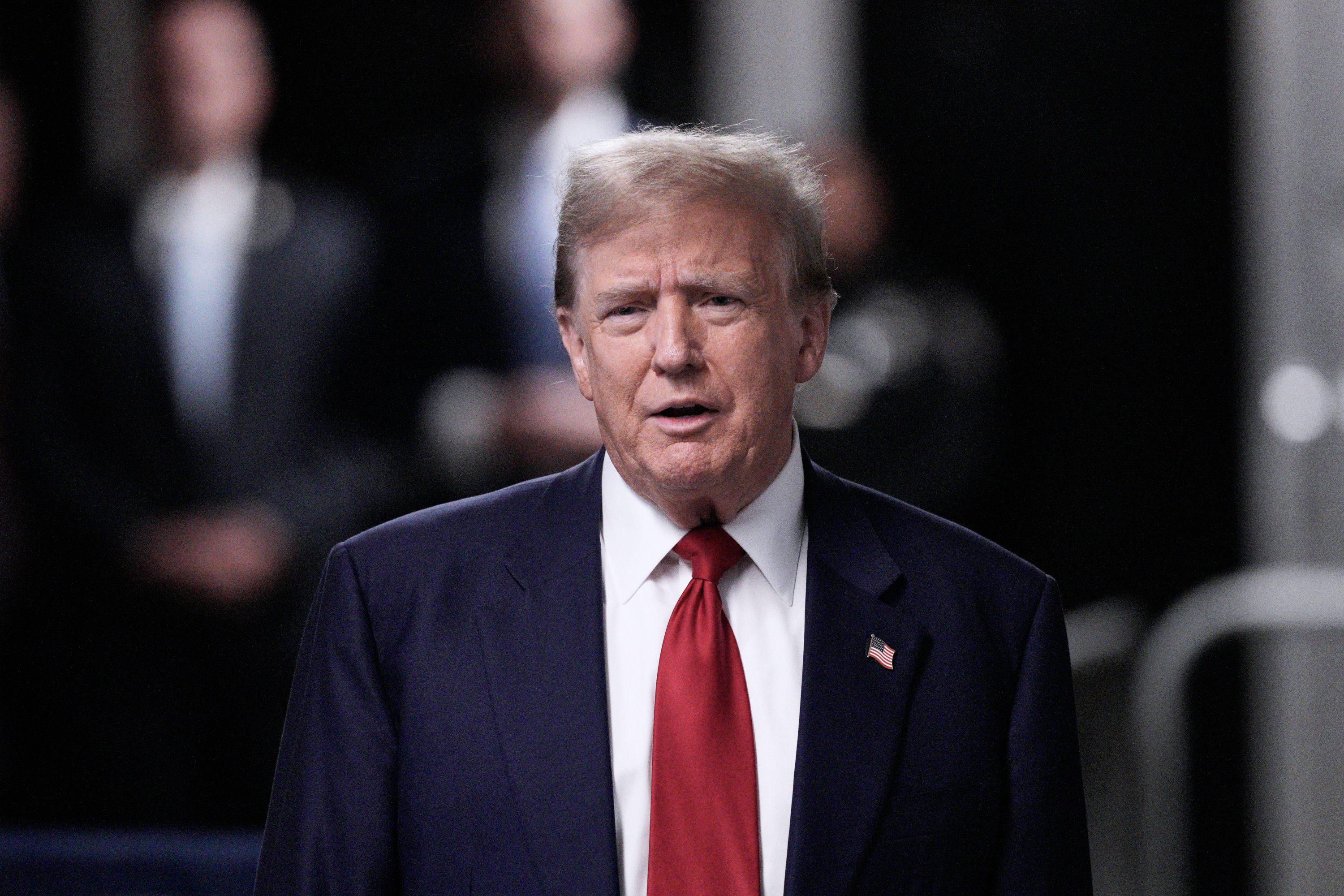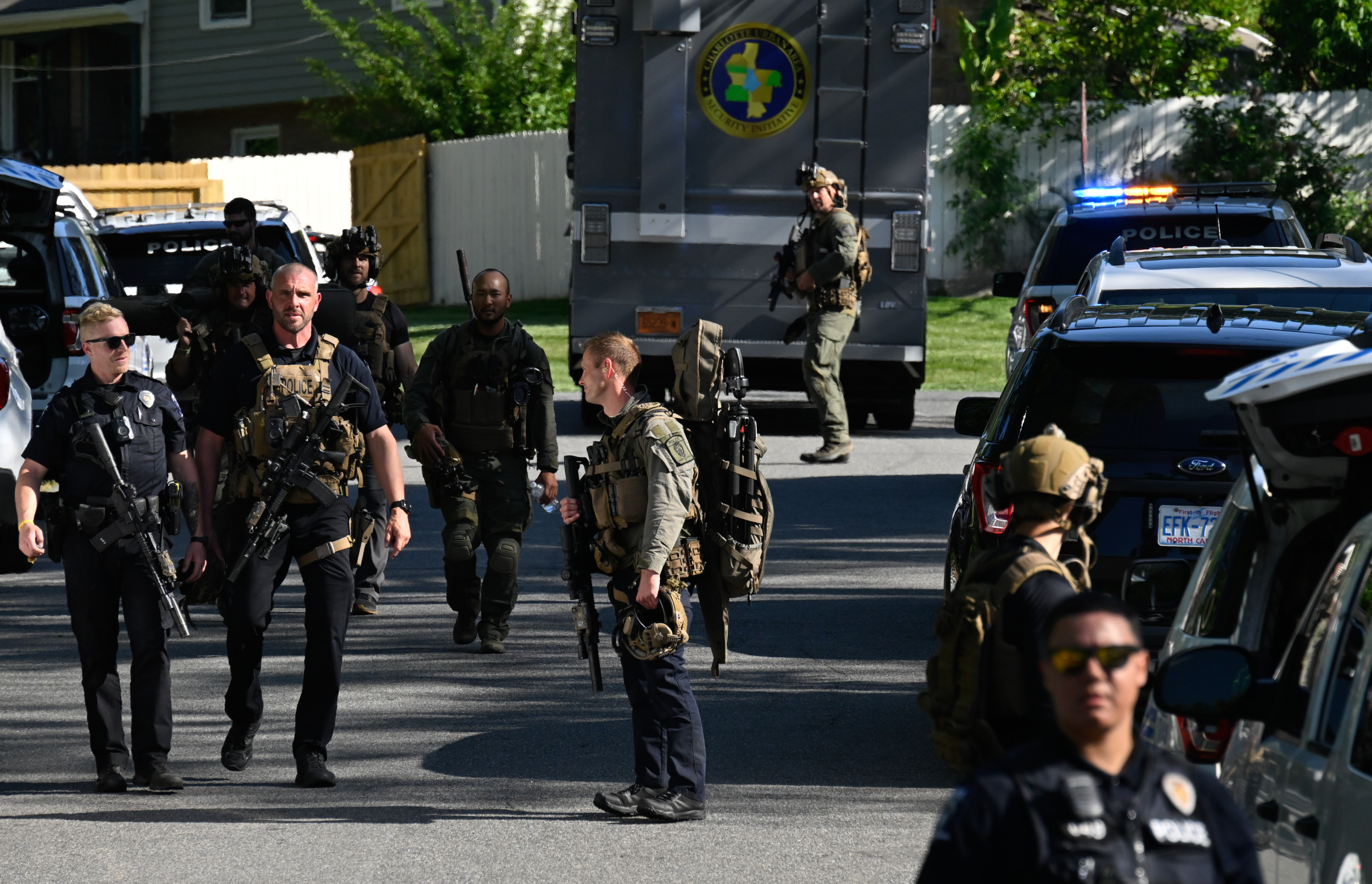While the crises emanating from the war between Israel and the Palestinian Hamas movement in Gaza have already expanded to frontlines in Lebanon, Iraq, Syria and Yemen, another Arab state known for its stability and close ties with the United States has found itself rocked by unrest linked to the nearby conflict.
Jordan, a kingdom with a close, complex relationship with the decades-long Israeli-Palestinian conflict, has witnessed some of its most intensive demonstrations in recent history, with protesters demanding the country and its royal family cancel key agreements with Israel due to the war.
While Jordan's security forces have a robust track record of quickly suppressing dissent at home, the relentless rallies have only grown in size and severity.
As forces, both internal and external, capitalize on popular outrage to promote their underlying agendas, unprecedented pressure is building across the kingdom, threatening to cross the line from urgent appeals of solidarity to something potentially more sinister.
"Jordan has been negatively affected in all aspects of life as a result of the war in Gaza," Saud al-Sharafat, a retired brigadier general of the Jordanian General Intelligence Directorate and former National Policy Council member who today serves as founder and director of the Amman-based Shorufat Center for Globalization and Terrorism Studies, told Newsweek.
This is particularly the case, he warned, when it comes to Jordan's oft-touted national security, "which now faces real risks, especially if the war in Gaza continues and expands in scope."
Newsweek reached out to the Jordanian Embassy to the United States for comment.
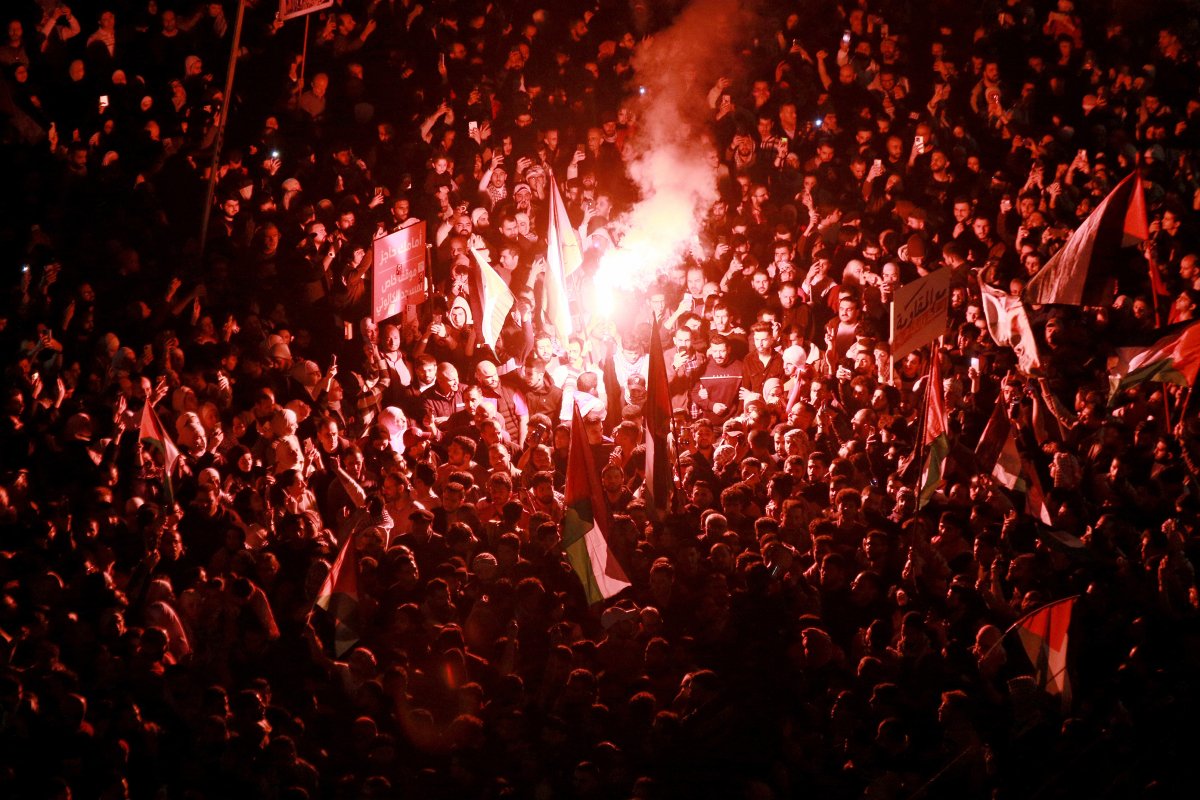
Threats from Within
Protests in Jordan calling for tougher measures against Israel began in the immediate aftermath of the October 7, 2023, surprise attack led by Hamas. Crowds have gathered in Amman every Friday to express pro-Palestinian sentiments and call on their government, led since 1999 by King Abdullah II, to do more.
These demonstrations underwent what Sharafat described as a "qualitative shift" beginning last week.
Protesters went as far as to clash with security forces and threatened to storm the Israeli Embassy in Jordan, which established diplomatic relations with Israel three decades ago amid the ongoing Oslo Accords that promised to bring lasting peace to Israelis and Palestinians.
Just as the once-hailed Oslo agreements have come under scrutiny over the years due to their failure to address the longstanding conflict, however, the Israeli-Jordanian peace treaty has also been subject to attack by critical actors within the kingdom.
Among them is the Muslim Brotherhood, from which the Hamas movement emerged in Gaza in the 1980s. Sharafat pointed out how supporters of the international Islamist movement, represented in Jordan by the Islamic Action Front party, have been "demanding the cancellation of this treaty, and even demanding the opening of the borders with Israel and the closure of American bases in Jordan."
Some of these demonstrations have also explicitly endorsed Hamas, whose leaders, including senior political official Khaled Meshaal and Al-Qassam Brigades commander Mohammad Deif, have called directly on Jordanians and other Arab peoples to mobilize on the streets in response to the conflict.
Sharafat noted that the Muslim Brotherhood is not the only faction channeling outrage among Jordanians, which he described as also linked to "an emotional and spontaneous human expression of popular anger over Israel's practices against civilians in Gaza and the occupied territories."
He argued that several nationalist and leftist parties, opposition leaders, and military veterans are also amplifying the protests.
"All of them are fundamentally opposed to the Jordanian regime and its royal structure," Sharafat said. "They are the ones currently promoting and calling for an escalation of the state of protest and extremism in demands in the street, under the pretext that the state is negligent in supporting the Palestinian people in Gaza."
"I believe that the war in Gaza was an opportunity for all opposition forces to raise their voices against the state," he added.
Mohammad Abu Rumman, a former Jordanian youth minister and now a researcher at the Center for Strategic Studies in Amman, also pointed to a broad coalition of groups, from Islamists to leftists, who are entering the political fray over the war in Gaza.
While Abu Rumman told Newsweek that Jordanians have a history of taking to the streets, he said that the current demonstrations have reached "unprecedented" levels.
No Substitutes
One of the primary factors Abu Rumman sees as fueling Jordan's susceptibility to the second-order effects of the crisis in Gaza is geography.
"Jordan is located in the heart of the region," he said, "and any tremors, such as the earthquake that occurred in Gaza, will hurt Jordan."
Another is demography. More than half of Jordan's population of around 11.3 million can trace their roots to Palestinian origins, most of whom have been granted citizenship, and the country hosts up to 2 million Palestinians in refugee camps. Queen Rania was born in Kuwait to Palestinian parents.
But Jordanian leadership has been adamant that it would not accept new waves of refugees as a result of the ongoing war in Gaza or the growing Israeli settlement of the West Bank, which borders Jordan. Here, Abu Rumman noted, there is "historical concern in Jordan about the existence of an Israeli agenda to forcefully transfer or displace" the Palestinian population.
In decades past, the most serious threat to the ruling royal family stemmed from an armed uprising staged by Palestinian militias relocated to Jordan. Amid worsening tensions, in September 1970, known as "Black September," the Palestine Liberation Organization, whose successors now lead the Palestinian National Authority in the West Bank, launched a bid to overthrow the monarchy. They were ultimately defeated and expelled to Lebanon, serving as a prelude to that country's civil war that erupted just years later.
While Islamist militant groups such as Al-Qaeda and the Islamic State (ISIS) have attempted to stir instability to little success in the years since, an even greater threat identified by Jordan today emanates from Israel and, potentially, the U.S.
The so-called "Deal of the Century," unveiled in early 2020 by then-U.S. President Donald Trump and enthusiastically endorsed by Israeli Prime Minister Benjamin Netanyahu raised fears of a new attempt to substitute the establishment of a sovereign Palestinian state by effectively pushing Palestinians into Jordan.
President Joe Biden embraced the Trump-era Abraham Accords, which saw four more Arab nations—the United Arab Emirates, Bahrain, Sudan and Morocco—follow Egypt and Jordan in establishing diplomatic ties with Israel, but has largely snubbed the "Deal of the Century" framework. And, amid cooling relations with influential Arab monarchy Saudi Arabia, the Biden administration has boosted ties with Jordan.
With Trump once again vying for office this year and Netanyahu now openly discrediting the idea of a two-state solution for Israelis and Palestinians, however, Abu Rumman observed political circles within Jordan raising concerns over possible renewed attempts to install a "substitute regime" for Palestinians in Jordan.
"If we think of the scenario that Trump will return to the White House, it is a nightmare for Jordan, because it means the rethinking of what they call 'the Deal of the Century,' the 'regional peace,' the pressure on Jordan to accept positions on issues that Jordan has refused in the past," Abu Rumman said. "According to this, I think this is the first concern to King Abdullah II and to Jordan, what will happen the day after the war."
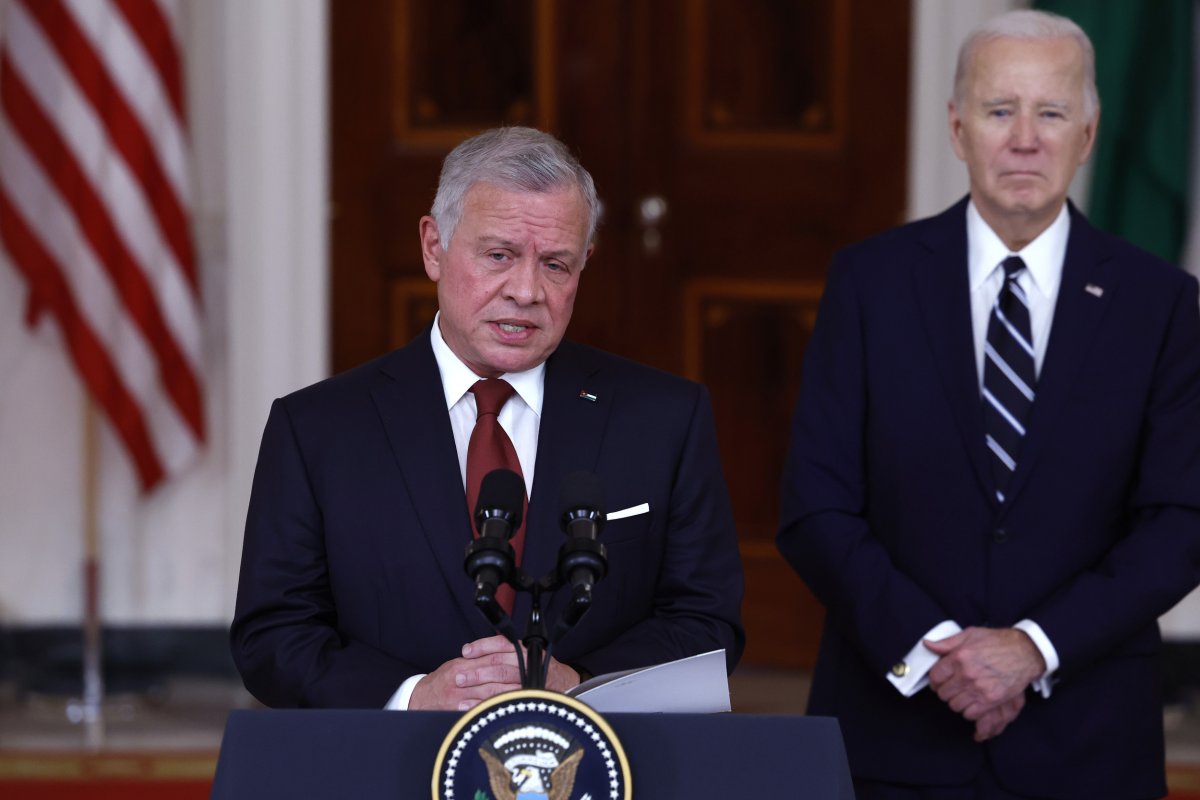
Red Lines
Though fears of radicalization among Jordan's disaffected youth are growing, direct criticism of King Abdullah II has been scarce.
"Until now, the protesters have criticized the government, their policy, and its relationship with Israel, but they are avoiding any criticisms of the monarch, which makes sense since that would be the red line for even further repression," Khalil Sayegh, co-founder and president of the Agora Initiative, which promotes constitutional democracy in the Middle East, told Newsweek.
Jordan has been led by members of the Hashemite family since the foundations of the modern state emerged from Ottoman rule in 1921, even prior to the kingdom's post-World War II independence from British colonization 25 years later. The Jordanian monarchy stood strong amid revolutionary and pan-Arab movements that swept much of the Levant, including neighboring Iraq and Syria, during the Cold War and was spared the worst of the 2011 Arab Spring protests.
Still, today, bolstered by tight security ties with the U.S. and no signs of active rebellion, Jordan commands stability in spite of nearby conflicts. And yet, Sayegh pointed to troubling indicators.
"We had seen pro-Palestine marches before that were quite big in Amman, Jordan, but we never saw one as organized, and it has continued for over eight days now," Sayegh said. "Also, it's important to understand that the Jordanian security apparatuses have been working on trying to ensure those protests fail, but the fact that they were not able to tell us something about how angry the public opinion is."
The Axis of Resistance Reaches Jordan
Also working in Jordan's favor has been the absence of another revolutionary trend that has swept neighboring countries in the form of largely Shiite Muslim-majority movements aligned with Iran's informal "Axis of Resistance" coalition now more active than ever over the war in Gaza. Up to 96 percent of Jordanians are Sunni Muslims, and few, if any, substantive attempts have been made to activate Iran-linked units in the kingdom.
But the situation may be changing on this front as well. After an attack widely attributed to Israel struck Iran's embassy in Syria, reportedly killing seven officials and drawing widespread regional condemnation, including from Jordan, Iraq's Kataib Hezbollah threatened Monday to mobilize and arm some 12,000 fighters among the "Islamic Resistance in Jordan" in order to begin "cutting off the land route that reaches the Zionist entity."
Jamal al-Shalabi, a professor at Hashemite University in Amman, warned a worsening conflict in Gaza could give such forces an opportunity to pave once-elusive inroads into Jordan.
Shalabi told Newsweek that Israel's commitment to pressing on with the war "increases the chances of attempts by some Arab organizations and factions supported by Iran, such as the Lebanese Hezbollah or the Iraqi Popular Mobilization Forces, some Palestinian factions in Syria and Lebanon, and others, to pass weapons through Jordan, to send them to the West Bank, or perhaps launching missiles and drones through Jordanian airspace, which will necessarily create a threat to Jordanian national security."
"This danger, its various dimensions, and its consequences on the Jordanian state and its national security cannot be accurately predicted," he added.
Faced with an array of emerging threats from within and without, Shalabi asserted that, "certainly, Jordan will face a 'security dilemma' if the brutal Israeli war against the Palestinian people in Gaza continues."
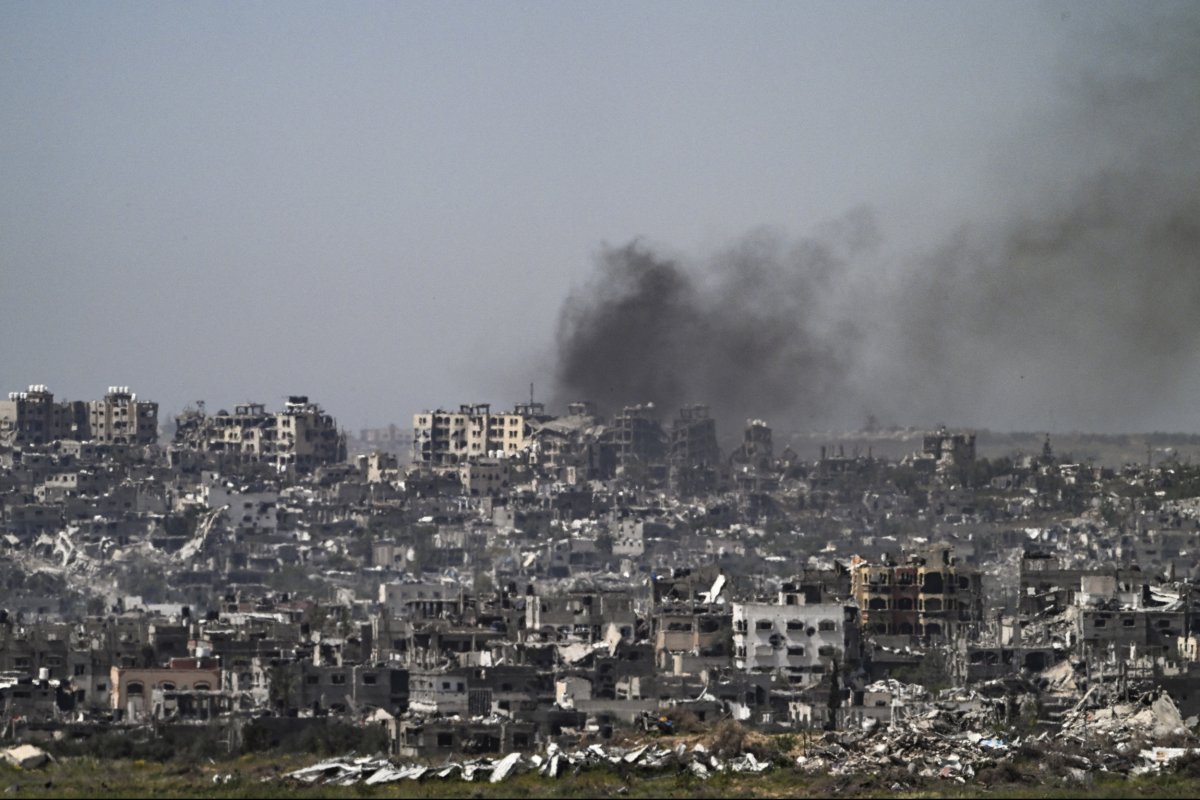
A Looming Showdown
With no clear end in sight to the conflict in Gaza now approaching its half-year mark, just how far Israel goes in its bid to score a decisive victory against Hamas and also impose further measures on the West Bank remains a potentially existential concern for Jordan, whose royal family remains the official custodians of Islam's third-holiest site, located in the disputed city of Jerusalem.
"There is a fear that once the war in Gaza is over, Israel might seek to undermine Jordan's stability, either directly, by reneging on commitments such as honoring Jordan's role as custodian of Al-Aqsa compound or refusing to supply Jordan with its quota of water under the peace deal," Osama al-Sharif, an Amman-based journalist and political commentator, told Newsweek.
"It might even go further," he added, "as to create tensions between East Bank Jordanians and Jordanians of Palestinian origin in the kingdom by promoting the 'Jordan is Palestine' far-right mantra."
Even as public pressure builds, however, few expect a termination of the 30-year-old Israeli-Jordanian peace treaty. Where Jordan may be forced to turn its attention, Sharif argued, is at the source of threats at home.
"A public showdown with the Islamist movement is possible," Sharif said, "as indicated by the recent public statements by Jordanian officials criticizing Hamas and the Muslim Brotherhood."
"How far will that confrontation go and at what cost," he added, "is difficult to measure."
Uncommon Knowledge
Newsweek is committed to challenging conventional wisdom and finding connections in the search for common ground.
Newsweek is committed to challenging conventional wisdom and finding connections in the search for common ground.
fairness meter
To Rate This Article
About the writer
Based in his hometown of Staten Island, New York City, Tom O'Connor is an award-winning Senior Writer of Foreign Policy ... Read more
To read how Newsweek uses AI as a newsroom tool, Click here.



